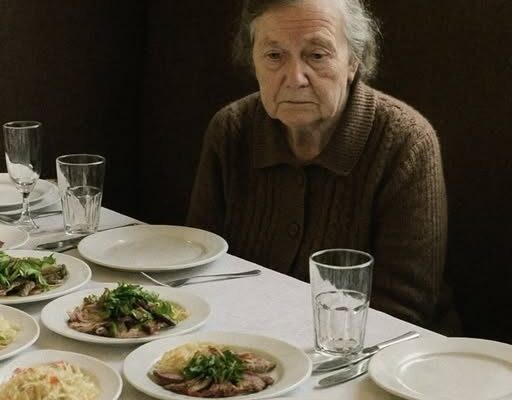Every café has its regulars, and ours was Miss Helen. For nearly eight years she had been a familiar presence, always cheerful, always polite, and often with her grandkids in tow. That morning, though, the air felt different. I unlocked the door like I did every day, keys jingling in one hand, apron slung over my shoulder, and the smell of cinnamon buns and dark roast filling the room. But as soon as I looked toward the corner by the window, I knew something was off.
There sat Miss Helen, alone at a table that looked more like a child’s party scene than a quiet breakfast nook. Pink streamers drooped from the edges, a boxed cake sat unopened in the center, and a vase of fake daisies tilted to one side. She wasn’t smiling the way she usually did when she waved hello. Instead, her eyes carried a quiet sadness, the kind that pulls at you without a word being spoken.
I approached her, trying to mask the worry in my voice. “Are you waiting for your family, Miss Helen?” I asked gently. She looked up with a soft smile, the kind that tries to hide disappointment. “I invited them,” she said. “But I guess they’re busy.” Her words were simple, but the weight of them settled heavily in my chest. Birthdays were supposed to be a time of gathering, of love and laughter. The thought of her sitting there alone on her day made something in me ache.
Miss Helen had told us stories before about her daughter, who often rushed in and out without much conversation, always pressed for time. We didn’t judge—life is hectic for everyone—but seeing the absence on this day, of all days, was hard to ignore. For a moment, the café felt unbearably quiet, the background music too faint, the smell of fresh pastries almost cruel in its cheeriness.
Tyler, one of my coworkers, noticed too. He asked what was wrong, and when I explained that Sam, our supervisor, wouldn’t approve of us lingering at a customer’s table, he didn’t even pause. “Then I guess he better fire me,” Tyler said, and with that he grabbed a plate of Miss Helen’s favorite chocolate croissants and walked straight to her table. Emily followed, bringing over fresh flowers from the counter. Before long, the rest of us were there too, sitting around her like family, filling the air with chatter and laughter.
Miss Helen’s eyes lit up as she began sharing stories from her past—how her brothers once filled her birthday cake with hot peppers as a prank, how she might have once served coffee to Elvis Presley without realizing it, how she met her husband at a pie-eating contest where neither of them actually won but both walked away with something better. We were captivated. For hours, the café transformed from just another workplace into a circle of friendship and warmth.
When Mr. Lawson, the café’s owner, walked in and saw the scene, we braced ourselves for a lecture. But instead, he smiled, pulled up a chair, and joined us. Later, he told me that what we had done was the very definition of hospitality. Not long after, he promoted me to manager of a new location, rewarding the team for showing the kind of heart that can’t be taught in training.
Miss Helen still visits us every day. She always brings a flower for the counter—a small gesture, but one that reminds us of that day when we chose to step outside the ordinary rules and do something extraordinary. And now, whether it’s her birthday or just a regular Tuesday morning, we make sure she never sits alone again.



